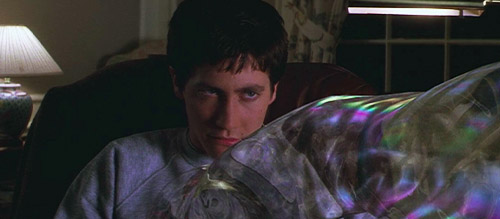
Donnie Darko (2001)
Director: Richard Kelly
Screenwriter: Richard Kelly
Starring: Jake Gyllenhaal, Maggie Gyllenhaal, Jena Malone, Drew Barrymore, Mary McDonnell, James Duval, Patrick Swayze
The idea of the world ending feels much more believable now than it did when we first met Donnie Darko 20 years ago. In fact, the idea of a jet engine spontaneously falling out of the sky sounds quite mundane these days – chances are, it wouldn’t even make front page news.
Richard Kelly’s eerie, mind-bending debut feature is one of the defining examples of the term ‘cult classic’; made with not much money and pulling in even less on release, Donnie Darko has since became a favourite of angsty teenagers, your douchebag ex, film bros and spooky sci-fi fans alike. It follows young Donnie (a hypnotising Jake Gyllenhaal in his breakout role), a troubled teen who starts seeing visions of Frank, a grown man in a dark, skeletal bunny costume, after he avoids being crushed by a falling plane engine that lands in his bedroom. Donnie meets a girl, Gretchen Ross (the always brilliant Jena Malone), and develops a fascination with time travel – all ahead of Halloween, the day on which Frank tells him the world will end.
There’s an enigmatic yet easily digestible quality to Donnie Darko that makes it the perfect bridge from mainstream childhood movies to a kind of cinema that is more complex and open to interpretation. Kelly’s expert blend of trippy scientific concepts, creeping horror and black comedy feels unexpected, grown up – and yet, the quirky characters and high school setting imbue it with a refreshing sense of youth.
The time-travelling core to the plot is often the biggest source of debate – does Donnie actually go back in time, or were the whole 26 days, 6 hours, 42 minutes and 12 seconds in his head? The watery spheres that he sees project from people’s chests, determining their future path – are they real? Is Grandma Death a space/time maestro, or simply a crazy old lady stuck in an endless loop of checking her mailbox? There’s an explanation to be found if you look hard enough, engage in material created outside the film, or watch Kelly’s director’s cut – but there’s also satisfaction in the ambiguity, in the not knowing.
Despite being set in the late 1980s, the three dimensional world-building and sharp script mean that Donnie Darko still feels timeless. A bold, bouncing, synthy 80s soundtrack including Echo & The Bunnymen, Tears For Fears, and Joy Division, Michael Andrews’ hauntingly sweet piano score and the iconic Gary Jules cover of “Mad World” create an unmistakably Donnie sound that’s as good now as it was then. Set in election year, the rumblings of pushback against a Reagan presidency and debates over Dukakis in the Darko household could easily be a precursor to the red and blue divide in modern day America. The sickly self-help spouted by local ‘guru’ – and, as we later discover, paedophile – Jim Cunningham (Patrick Swayze), that is integrated into the school curriculum, speaks to our contemporary neoliberal culture, stuck in a swamp of life coaches, thinly veiled pyramid schemes, and individual responsibility instead of structural accountability.
Viewed through the specifically 2021 lens of a global pandemic, economic downturn and worsening climate crisis, this curious wonder of a movie is even more prescient. We, too, sit and wait for the world to end; the only difference between us and Donnie is that he, at least, knows when it is going to happen. We, too, are Gretchen Ross, searching for small reminders of how beautiful the world can be – unfortunately, lack of human contact means we can’t find them in a kiss. We, too, are Grandma Death, refreshing our timeline and emails, checking our mailbox for some kind of sign from the future that everything’s going to be okay. We, too, are Drew Barrymore, screaming ‘FUCK’ into the void.
Frank tells Donnie that if the sky were to open up, there’d be ‘no rules, no law’. Plane ephemera may not be crashing to Earth, but between new virus variants, political uprisings and our current inability to live through one day without some kind of catastrophe, it sure as hell feels as though the sky is still falling.
This cruel alignment doesn’t make Donnie Darko a miserable watch 20 years on – quite the opposite. There is kinship in ours and Donnie’s shared existential dread. There’s a sort of comfort in witnessing one boy’s personal apocalypse, and how, in the end, he is laughing in the face of it.
22/24

